It might seem strange to discuss the mental health of a fish, but Bettas are intelligent creatures. There are also a number of ways to tell if your Betta is depressed.
Fish become depressed in a very similar way to how humans do. It’s an overwhelming sadness that can impact the overall quality of life of your fish.
So how can you tell if your Betta is depressed? What are the signs and, more importantly, what can you do to remedy it?
There’s a lot to unpack here, so let’s take a detailed look at Betta fish and depression – but the good news is, if you think your Betta fish is depressed, you can help them recover.
How do I know if my Betta is depressed?
There are a number of different signs that a Betta fish is depressed, including a lack of appetite, swimming close to the bottom of the tank, becoming withdrawn, and losing its color. Depressed Betta fish may show some or all of these signs, and they can become physically ill too.
That’s why it’s really important to treat depression with your Betta fish – it’s not just ‘sadness’ in the same way that depression in humans is not just someone feeling a bit sad.
It’s a serious condition that can have a lasting impact on your Betta, including shortening their life.
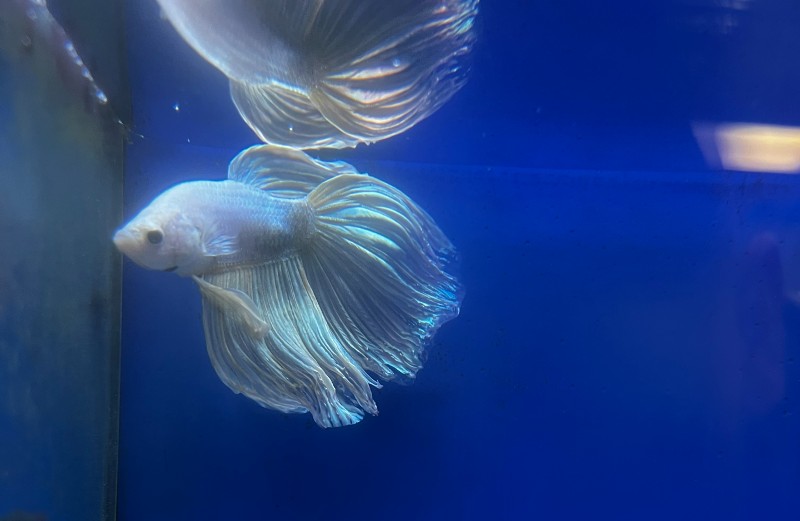
Here’s a little more detail on each of the potential symptoms of a depressed Betta fish:
Lack of appetite
If your Betta fish stops eating, it could be a clear sign that they’re depressed. They become uninterested in food, and can either massively reduce their food intake or even avoid food altogether.
Obviously, this is not sustainable for any great amount of time, so if you notice a change in your Betta’s eating habits, be sure to take action swiftly so you can get them eating again.
Lethargy/swimming at the bottom of the tank
Betta fish are normally very active swimmers who will hang out in the top half of their tank, darting around and generally investigating anything that catches their eye. Not always – they will enjoy some quiet time too – but often.
So when you notice your Betta spending the majority of their time at the bottom of the tank, or barely moving at all, it can be that something is wrong with them physically, or it may be depression.
It’s similar to the way we feel as humans if we get depressed – it’s hard to summon the energy to be active. Your Betta may feel better if they did go for an active swim around their tank, but they just might not be up to it.
Withdrawing and hiding
Betta fish are normally confident and curious, and will enjoy having your attention. They will recognize you, and swim around when you come close.
So if you see your Betta fish hiding more, looking withdrawn or even scared and spending most of their time amongst plants and decorations, consider whether you need to make some changes to improve their happiness.
Loss of color
A Betta fish will lose its color when it has a physical illness, but also when it is going through depression or other mental problems.
Betta’s color often reflects their overall health – they will be vibrant and have flowing fins when happy, but dull when sad. They may have clamped fins when depressed too.

How do I know if my Betta fish is happy?
Signs that your Betta fish is happy include bold colors on the body, free-flowing fins, a lot of activity including showing signs of curiosity, and the blowing of bubble nests (in male Bettas). Don’t expect these all the time, but you should hope to see some of these signs regularly.
One of the easiest ways you can gauge your Betta fish’s happiness is to just look at their body.
A Betta fish in full health is absolutely glorious – they have amazing colorization on their body, and their long fins will be flowing freely and gently.

If your Betta fish looks healthy and happy just by looking at their physical appearance, then the chances are that they are happy.
Betta fish are also normally very active. Not constantly – they will want some downtime, where they will rest (not just resting their bodies, but preventing themselves from becoming overstimulated too).
However, most of the time, expect to see your Betta fish swimming around their tank, mainly in the top half, investigating anything new.
If you walk up to the tank, they will likely swim around to watch you, and if you stick your finger into the water then they might swim up to it, acting curiously.
Also, if your Betta fish is a male, look out for signs of them blowing a bubble nest. Not all male Bettas will blow a bubble nest, and even when they do it might be infrequent.
But, a Betta fish that is depressed is very unlikely to make a bubble nest at all – so if they are making one, it’s a really good sign.
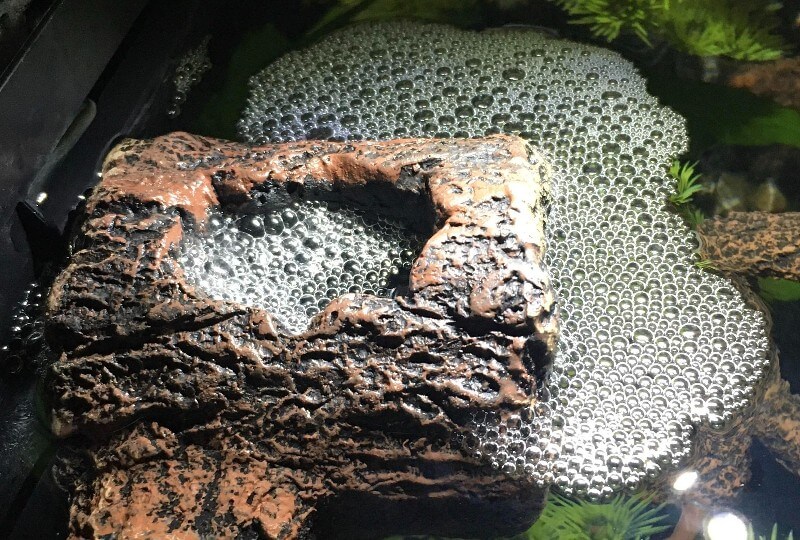
Don’t be afraid to disturb or even destroy a Betta’s bubble nest during feeding or tank maintenance. They’ll quite happily just make a new one!
Are Betta fish sensitive to their environments?
One of the most common causes of depression in Betta fish is poor conditions. This includes water parameters being incorrect, not having enough places to hide, the tank being too small, powerful water filters disturbing the water, and sharp fake plants or rocks creating a hazard.
Betta fish are very sensitive to their water parameters, and if the conditions aren’t quite right then they will quickly sink (literally) into depression.
The temperature needs to be maintained between 75 and 80 degrees Fahrenheit, with a pH between 6.5 and 7.5.

Clean water is also essential, so make sure you keep up to date with water changes. But do it carefully, to avoid temperature shock.
You’ll also want to make sure that the tank is big enough, and it has places to hide. A single Betta fish should have at least 5 gallons of water, but more is better. And they need places where they can relax, so include plant life.
Plants and decorations
Natural plant life is better because if you pick the right plants they will help to maintain the ecosystem of the tank.
They’re also softer too. Another factor in Betta depression that you might not have considered is the sensitivity of their fins, which can easily tear when they hit a sharp surface.
Artificial plants and some stones can therefore be really uncomfortable for a Betta. They can put them on edge, which makes them feel depressed in their surroundings. Make sure they have a home where they can relax.
Filters and aeration
And one other thing to consider with their tank is the strength of the filter. You might assume that a strong filter is better since it helps maintain cleaner water.
But if the jet on the filter is too powerful, it can really disturb the water, which in turn disturbs your Betta.
They want to be able to swim around freely, not have a large current forcing them away from the surface. So add a cover or a sponge to diffuse the jet, if you need to.
In an effort to increase the oxygen levels in my Betta’s tank, I once moved the filter higher up so it would disturb the surface of the water.
However, this caused a strong current, which my Betta was clearly uncomfortable with as he struggled to rest on plant leaves at the surface.
He began to hide away more in his cave, and rest in the lower areas of the tank where he could find calmer waters.
As a solution, I installed an air stone and moved the filter back down to the bottom of the tank. Here, plant leaves and roots blocked the current created by the filter outlet. Meanwhile, the air stone was creating bubbles that disturbed the surface and allowed gas exchange which aerated the water.
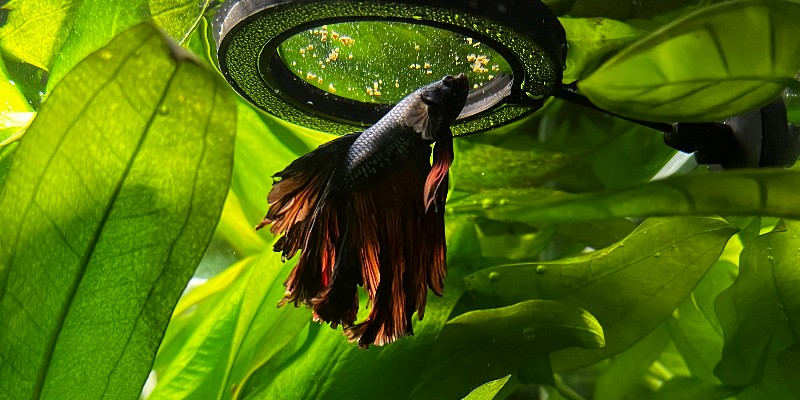
Do Betta fish get lonely?
Betta fish do not tend to get lonely, and living alone is not a common cause of depression in the species. Most Betta fish prefer solitude, or at least with tank mates that stay out of their way. Putting two male Betta fish together is a bad idea.
That’s because Betta fish are territorial, and will look to protect their own space. Adding two male Betta fish together is asking for trouble as they will almost certainly fight over space.
Even putting a male and a female Betta fish together can cause problems. During mating season they may appear to co-exist briefly, but most of the time they won’t.
Indeed, it’s often recommended to use tank separators when trying to breed Betta fish, so that each has its own space and cannot attack the other.
Another common mistake is putting too many female Bettas into a small tank. There are even those who will argue for keeping female Bettas together in a 5-gallon tank, which is a recipe for disaster.
Betta fish will live quite happily alongside some other smaller species of fish that stay out of their way. It’s best to choose fish that prefer to spend more time lower in the tank, away from the Betta.
Just be careful not to choose very small fish. While this may put the Betta even more at ease, they could also consider the fish to be food.
Do Betta fish get bored?
Betta fish can be known to get bored, especially if their tank is too small or too bare. Make sure they have plenty of space to swim freely, and a good amount of plants of varying heights for them to explore and hide amongst.
Some people recommend moving things around in the tank every couple of months to freshen things up, just as you might rearrange the furniture at home for a bit of a change.
This doesn’t mean completely changing everything in the tank – just re-ordering it to make the space fresh and feel new. It might not make a difference to your Betta, but it could help prevent them from getting bored.
You can also do this with items outside the tank as well. Introduce new things adjacent to the tank, if you’ve space, and it will give your Betta a new environment to swim up to and explore.

How can I help my depressed Betta fish?
The best way to help a depressed Betta fish is to tackle the cause of the problem. Identify what is making your Betta fish depressed, and correct it. Make sure their tank is suited to them, that they aren’t living with a fish that intimidates them, and that they aren’t bored.
Let’s take a look at each potential cause of depression, and how you can fix it.
Move your Betta to a bigger tank
A really simple fix. If your Betta fish is in a tank that’s too small, you’ll need to upgrade. It should be at least 5 gallons if the Betta is living alone, or ideally 10 gallons if living with a small number of tank mates.
If you do need to upgrade to a larger tank, make sure your tank is fully cycled first. It usually takes 4-6 weeks for a new tank to develop a functioning nitrogen cycle.
You can speed up the process by introducing beneficial bacteria. Using fresh nitrifying bacteria like Nitrico Goop can speed up the process to around 2-3 days, which is ideal if you’re concerned about your Betta’s health in the short term.

Whether you’ve cycled your tank over a six-week period or used Goop to speed things up, you’ll need to be aware of the impact of moving your fish to a new tank.
Ideally you’d recreate the water parameters and temperature to be as close to the original tank as possible. However, you should still drip acclimate your Betta to its new water conditions.
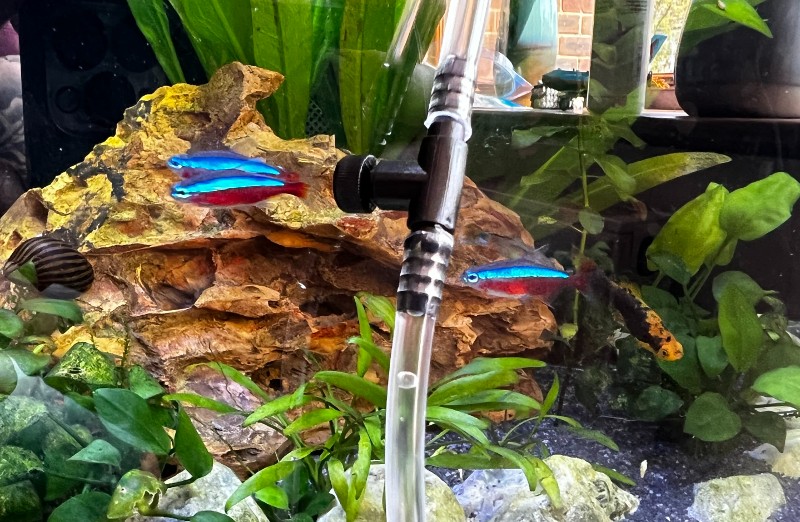
Using inline tubing with a flow regular allows you to drip the new tank water into the bag or bucket containing your Betta over the course of an hour or so. This means your fish friend gradually gets exposed to the new water rather than being suddenly immersed in it.
Going into completely new water, even if the parameters are entirely suitable for your Betta, risks shocking your fish.
Make sure your water parameters are correct
You should be using a water testing kit every few days to keep tabs on the parameters of the tank, and if they start to show that your water conditions aren’t right, you’ll need to take action.
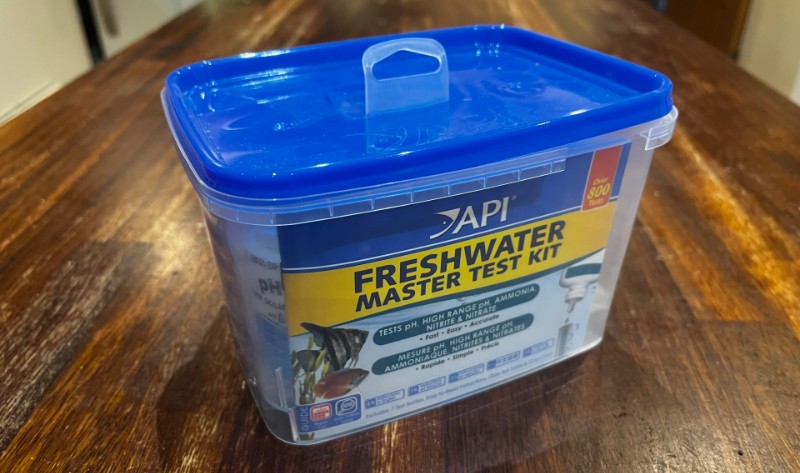
If the temperature isn’t correct, check whether your heater is working correctly.
Make sure that water changes aren’t done with water that is a very different temperature – even if you’re only changing 10%, adding in cold water can cause serious problems.
If the pH is wrong, consider whether the water needs to be cleaned more frequently.
If you’re overfeeding your Betta and food is being left to rot, it can raise the ammonia levels too, so consider feeding your Betta smaller meals more regularly.
Make sure the filter isn’t too powerful
The filter being too powerful can normally be resolved by adjusting its position or adding something to diffuse the jet. If you can’t do that yourself, you may want to replace it.
Look for one that advertises itself as having a gentle flow or a sponge to soften the jet, and if you’re still not sure then head to your local pet store – they should be able to advise you on a good replacement option.
Only use suitable tank decorations
Sharp edges could be causing your Betta to feel depressed if they are injuring themselves during swimming. The solution here is relatively simple – check your tank decorations for any sharp edges, and remove them.
It might be rocks with jagged edges, or cheap artificial plants that have sharp plastic leaves. Replace them with soft, natural plants if you can as these will be much more pleasant for your Betta to swim through.
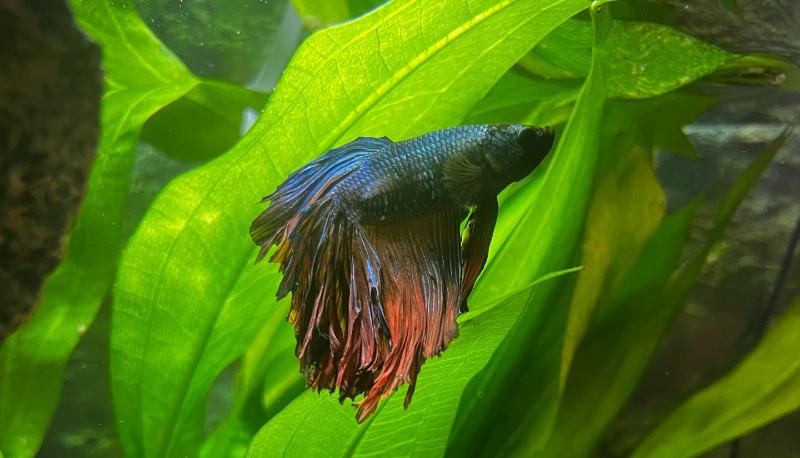
Make sure your Betta isn’t intimidated by a tank mate
If your Betta isn’t getting along with a tank mate, and it is causing them to be depressed, the only solution is to separate them.
Unfortunately, you can’t talk them round into being friends and getting along.
This might mean that you have to have two aquariums in your home instead of one, and if that’s not sustainable for you (if you just don’t have the space) then unfortunately you may need to rehome one of the fish.
It’s better to let them live a calm and quiet life on their own, with you or someone else, than force them to be depressed and intimidated sharing a tank with a fish they don’t get along with.
Make sure your fish can’t get bored
If you think your fish may be suffering from boredom, consider adding more plant life and decorations to the tank, or even just rearranging the ones that you already have.
You can also change up what’s surrounding the tank, to give it something new to look at.
If you’re adding new plants, make sure they’re suitable for Betta fish, and keep a close eye on the water parameters for a few days after you’ve added them.
Plants will naturally improve the conditions of the water by absorbing toxins and breathing out oxygen, which is beneficial for the tank’s ecosystem.
Can Betta fish recover from severe depression?
Betta fish have been shown to recover from severe depression, providing you act quickly and take the appropriate action. Betta fish are surprisingly hardy and can make drastic recoveries if given the proper care.
Hopefully, if you’re a Betta owner, you never have to see your Betta fish become severely depressed. That would happen if something was wrong and it wasn’t addressed.
The physical symptoms will become much more severe – they could lose all color from their body, spend all of their time hiding, and even swim on their side or in other erratic ways. They may completely stop eating too.
If you ever encounter a Betta in this state – perhaps it’s a Betta you’ve adopted from an owner who wasn’t able to look after them – you may think that they are beyond help, just by how drastic things seem.
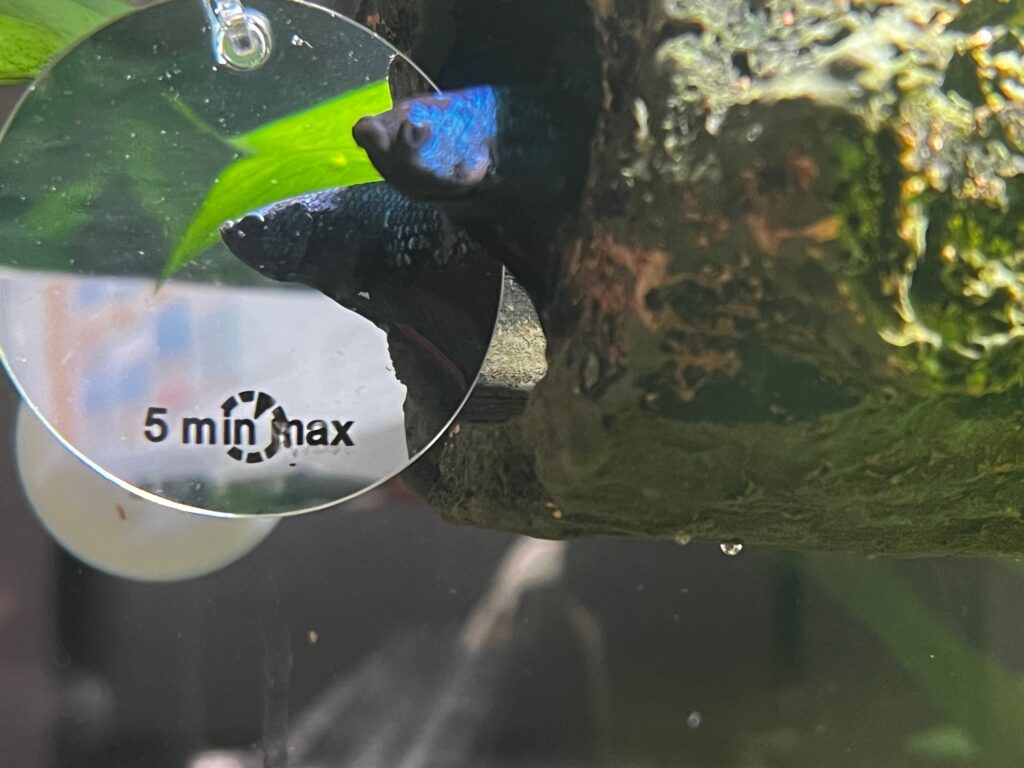
But, you would be surprised at how resilient Betta fish can be. It is always worth trying to help a Betta because their recoveries can be dramatic.
The best way you can help a severely depressed Betta fish that has then developed a physical condition is by setting up a hospital tank, and giving them extra attentive care until they are fully recovered.
How to set up a hospital tank for a depressed Betta fish
A hospital tank is designed for Betta fish that are showing signs of physical illness which may have been partially caused by depression and stress.
It’s a separate tank just for your Betta that uses a mix of aquarium water and freshwater, that you are carefully monitoring for conditions.
The primary aim of a hospital tank is to medicate your Betta fish. It’s not about providing an alternative tank that just has the correct parameters – you should be making sure the main tank is correct for them anyway.
Instead, a hospital tank will allow you to treat any illnesses which could be causing your Betta to feel worse, before returning them to the main tank. Again, this tank will need to be cycled so it’s good practice to have a small tank set up at all times, just in case.
Make sure the tank is heated to the ideal temperature range and that the pH is as close to 7.0 as possible. You still need a filter, and a hiding space – you don’t want your Betta becoming stressed while they recover.
Do Betta fish get depressed as they get older?
It may appear that your Betta fish is getting depressed as they get older, but it is normally just signs of old age. Aging symptoms are similar to that of depression in Bettas – they will lose color in their fins, and they may be more lethargic.
The key difference here is that while you want to treat depression in a Betta fish, you can’t treat old age.
You can make your Betta as comfortable as possible, but you can’t turn back time. A Betta fish lifespan is around 2 to 4 years.
If your Betta fish is two years old or older and is showing signs of depression, it may just be nearing the end of its life.

If that’s the case, you can try some of the solutions in this guide to improve their mood, but don’t expect a full recovery. Instead, just give them the best care possible so that they enjoy their twilight months.
FAQs
Summary
It can be really disheartening when your Betta fish doesn’t seem to be happy. No Betta owner wants to have a depressed fish, and because they can’t communicate with us it may seem hard to know what to do.
Be patient. Work through this guide as a checklist – ticking off every potential cause and trying the solutions for the most likely problems.
Betta fish are intelligent, but they aren’t complete mysteries. You will likely get to the bottom of their depression, and then you can work out the best answer.
And as always, make sure you keep on top of water changes and check the parameters. It’s the easiest way to keep your Betta happy and healthy.
